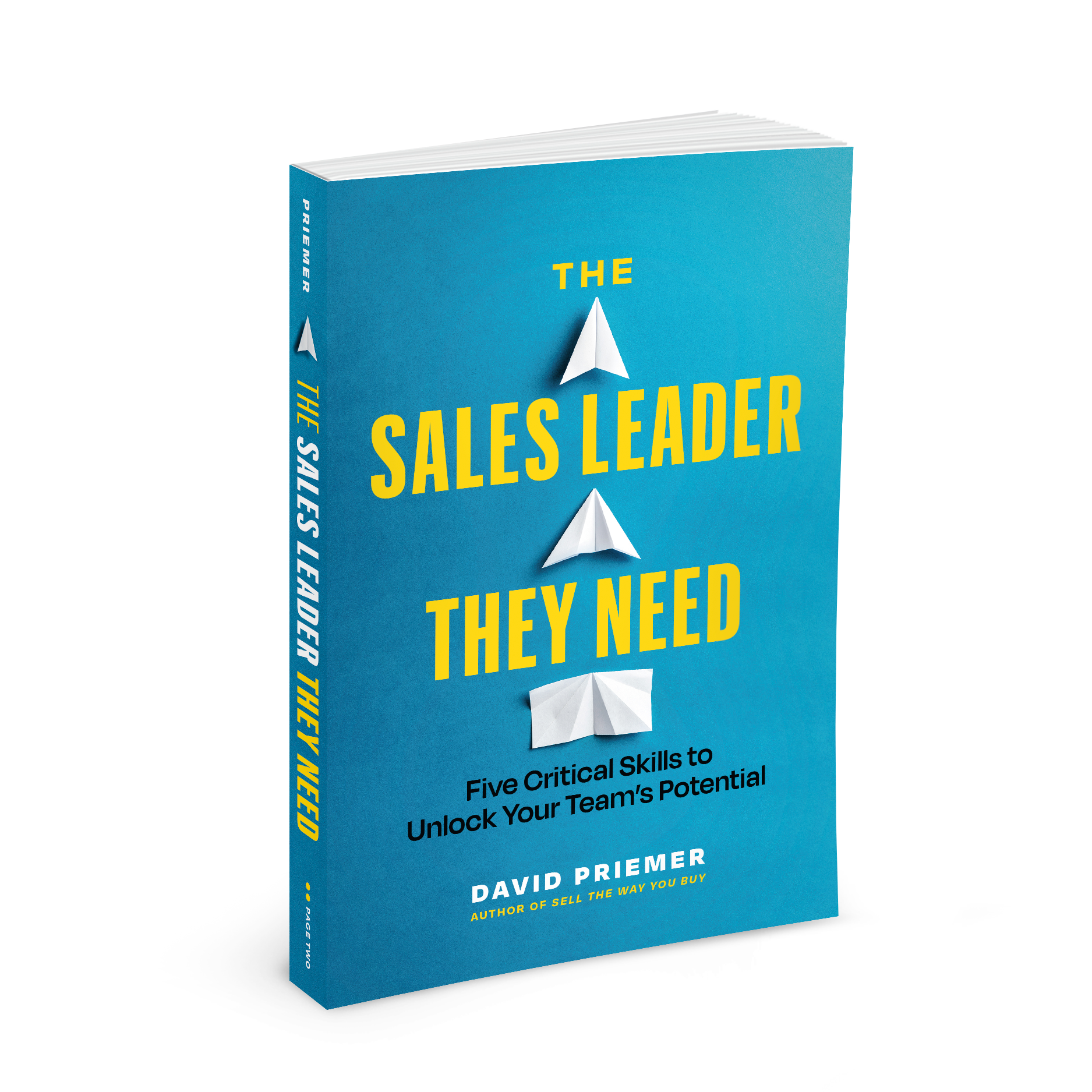What Having Cancer Taught Me About Sales
As we’ve all learned over the past few years, with adversity comes perspective.
Being diagnosed with cancer gave me lots of it.
I was thirty-six years old when I got the news, which, similar to many people, came out of nowhere. I was instantaneously thrust into a world of tests, scans, special doctors, surgeries, follow-up treatments, and the crazy rollercoaster of emotions that go with all the above. For a time, my future had been stolen.
Years later, with the grace of my incredible family and medical team, I returned to good health and came to see my diagnosis as one of my greatest blessings. I developed a renewed sense of gratitude. And as someone who started their career as a research scientist before spending two decades in the B2B sales trenches, this experience helped me connect so many powerful data points for how we navigate our careers and interact with customers.
Indeed, from negotiating tactics learned from going a few rounds with my kids, to objection handling lessons from pandemic politics, there are so many valuable sales lessons that life can teach us if we remain mindful and open to them.
And in the interest of turning lemons into lemonade, here are some of my top sales lessons learned from my experience with cancer:
1. Trust Can be Built Instantaneously Under the Right Circumstances
One of the hardest parts of my cancer journey was telling people. The people closest to me knew and everyone was supportive. But, I was afraid to go completely public with my news. It wasn’t everyone’s business. And the thought of people constantly asking me if I was okay or defining me by my disease was the last thing I wanted. However, despite my secrecy, there were people I opened up to immediately about my experience.
A colleague who revealed he had been caring for his father, who had been recently diagnosed with blood cancer. A young woman and mother who had recently been diagnosed with breast cancer. And an old friend from years back, who had recently lost her husband to the disease.
As I began to diagnose the patterns of my candor, a clear theme emerged. When I felt the other person was clearly in a position to help me, or I was in a position to help them, or there was a strong sense of trust and empathy created through shared experience, opening up felt easy and natural.
In sales, we try to get customers to open up about the most intimate details of their business challenges and their personal motivations for finding solutions to those problems. But customers, wary of our motivations and intentions, keep those insights closely guarded. That is, until they believe we are in a position to help them or clearly empathize with their journey.
Here, the right stories and emotionally connected value statements, delivered with humanity and conviction can work like magic, instantaneously building trust! But that level of authenticity doesn’t come without true caring, knowledge, and practice, which is why only the best sellers are able to wield this incredible power and connect with their customers on that level.
2. Humans (and Customers) Crave Certainty
Have you ever experienced the agonizing feeling of waiting for the results of an important blood test, X-ray, ultrasound, or MRI? I have, many times. And still do. The anxiety builds with each passing moment, blocking out rational thoughts as your mind races to contemplate, “what could this thing be?”, “why could it be taking so long?” or “what happens if it comes back positive?” This is our brain’s search for one of the most primal, critical, and satisfying emotions; certainty.
Humans crave certainty. From our days crowding in caves and around campfires, wondering if our village had enough resources to survive the cold winter ahead. Or in our ancestral homes, hoping our leaders had the might to defend us against invaders while we slept. Without certainty, our brains are forced into a frantic search for answers; trying to see our way to a finish line amidst variables we don’t control and knowledge we don’t possess. But when it arrives, a biochemical cocktail of hormones comes with it, making us feel at ease and secure.
Our customers feel the same way.
The problems they experience cause significant amounts of anxiety, stress, and tension. And if they had the knowledge, capability, and time to solve them themselves, they would have done it already. The best sellers are the ones that not only bring their customers solutions but certainty around them. Certainty in the outcomes they can deliver as well as confidence in their team, organization, and technology.
Consider these two pitches for a buyer struggling with lead and revenue generation for their business:
A: “Our proprietary platform uses AI and machine learning to find the highest quality leads to help boost your revenue.”
B: “Our lead-generation program is guaranteed to earn you $30K in additional revenue in 60-days, and if it doesn’t, we’ll work with you for free until it does.”
It’s clear the second option delivers much more certainty in the outcome than the first.
100% of buyers are humans. If you want to sell more, deliver the clarity and certainty their brains crave.
3. Mindset Matters
The mind is more powerful than most of us realize. One of the books I read on my journey was called Fighting Cancer Within. In it, the author references a powerful study by a UCLA psychiatrist who looked at outcomes from patients diagnosed with malignant melanoma. The researchers compared the outcomes of randomized control subjects with a group that participated in a six-week treatment soon after diagnosis. Interestingly, the treatment simply involved meeting for ninety minutes a week to practice mindset-related tactics (e.g. relaxation and behavioral coping skills to deal with stress). The results showed a remarkable advantage for those in the program, with superior immune system markers, levels of happiness, and much fewer deaths and disease recurrence.
Now, I’m not saying I was calm and relaxed throughout my journey by any stretch! But I was definitely aware of the tremendous influence mindset can have on outcomes and tried my best to not let it race to places that didn’t serve me. The mindset we bring to our sales interactions is no different.
I see this a lot in my practice, particularly with sales reps who are younger or new to their business. When you’re asked to call on buyers who are older and more experienced than you, it’s difficult to manifest the authentic conviction and narratives you need to convert them. I refer to this concept as experience asymmetry. This is especially prevalent in the B2B tech space where your solution may be one they’re not even aware of or know they need.
The same is true when it comes to negotiating agreements at the end of your month, quarter, or year. You might be stressed because you find yourself woefully behind on your quota attainment. Or you may find yourself frantically calling customers in a desperate search for revenue because your manager is putting pressure on you to “finish strong”. On the flip side, you may be sporting a high degree of confidence and calm because you’re well ahead of your numbers, repping a high-demand product, or feeling secure about the tremendous value your solution brings. Either way, rest assured your customers will feel the mindset you bring to your calls!
Choose your mindset wisely.
4. Resiliency Comes from Embracing Discomfort
When you’re diagnosed with cancer, you want answers. It starts with Googling WAY too many things! And continues with asking questions like, why me? What did I do wrong? Was I eating the wrong foods? Not exercising enough? Sitting in front of the computer too much?
The pursuit of answers is only natural. After all, as human sellers we crave certainty.
Unfortunately, these roads often lead to dead ends.
The truth is, my doctors and I don’t know why I got cancer any more than Steve Jobs, Kelly Preston, or my beloved Grandmother did. Sure, there are certain behaviors that clearly lead to negative outcomes, like smoking and lung cancer. But the complex reality is there are too many variables like age, birth sex, geography, lifestyle, occupation, family history, and even marital status, to crunch when it comes to figuring out the unique set of circumstances that led to YOUR particular outcome or prognosis.
The same thing happens in sales. Sometimes you win. Most times (statistically speaking) you lose. And when we lose, we want to know why. Did my pitch fall flat? Did I sound too insecure? Was the demo too confusing? Did I push too hard or not hard enough? Did the customer already have a preference or previous relationship with another vendor? Were we more expensive than the other options? Did it all come down to cost, and if so, how much did we lose by?
We want to understand the complex set of circumstances that led to the outcome so we can change our behaviors and optimize for the future. But sometimes, there are no answers to be had.
You may never find out why that customer ghosted you, why the most risk-averse buyer chose the least accomplished vendor, or why that executive beat you up for a 30% discount before deciding to shelve the project.
Of course, in sales, learning as much as you can about both your losses AND wins is critical to refining your sales motion. But the layers of resiliency you need in order to survive in this amazing profession over the years comes from knowing that in many cases, you won’t be able to connect the dots. Sometimes you just need to let it go, control what you can control, and move forward.
5. Be Grateful That You GET to do This
While recovering the week after my first surgery, I walked to the park with my family. I had two daughters at the time, then six and three, and plunked myself down on a bench to watch them play in the splash pad. As I sat there and saw the joy on their faces, time seemed to slow down. To this day, I remember what I was wearing, where I was sitting, the Starbucks green tea latte I had in my hand, and even the dancing sunlight as it broke through the tree canopies. I remember taking a deep breath, turning to my wife and saying “THIS is what it’s all about. This is what’s important.” In fact, in the days that followed, bringing my mind back to my work life as a VP of Sales at a high-growth start-up was difficult. It felt like it didn’t matter.
When you have cancer, the only thing you want in life is to not have cancer.
Not money, a new car, or crushing your quota and making it to the President’s Club. Since that day, the only thing I wish for when I have the privilege of blowing out my birthday candles every year, is to grow old and be healthy. That’s it. And with every new grey hair and wrinkle I see, I smile because my wish is coming true. I got my future back.
As a career high-tech sales leader, life was full of hard work, massive quotas, endless hiring, planning exercises, & lots of travel. And running my own practice for the past five years has been just as busy. But when things get stressful, it’s helpful to force yourself to stop, step outside the task, and reframe the things you HAVE to do as things you GET to do.
“Having” to do things means you’re being controlled by an external force, driving your sense of responsibility and pressure. “Getting” to do things promotes an intrinsic feeling of motivation and gratitude.
So instead of thinking, I “have” to attend all these planning meetings, think, I “get” to work with some of the most incredible leaders in the industry. Instead of, “I have to do all this recruiting/interviewing”, think, “I get to coach some of the most talented and enthusiastic team members I’ve ever worked with”. Instead of, “I have to travel”, “I get to work and have unique experiences in some of the most awesome cities in North America”.
As bad as your sales problems might seem, I suspect you wouldn’t trade places with someone fighting a disease, dealing with a personal tragedy, protecting their family in a war-torn country, or recoiling after a natural disaster ravaged their community. So, as strange as it might sound, be grateful for your massive quota and the fifty calls your manager expects you to make every day. Not everyone gets to do this.
Lessons in modern selling are woven into so many of our life experiences. From our highest highs to our lowest lows. Much like the profession itself, my rollercoaster ride to cancer and back was scary and uncertain. But still, I remain grateful for the perspective and lessons it taught me and the people those lessons help bring me closer to. I hope you’re one of them.
We promise never to send you junk or share your email! Just helpful sales insights.













